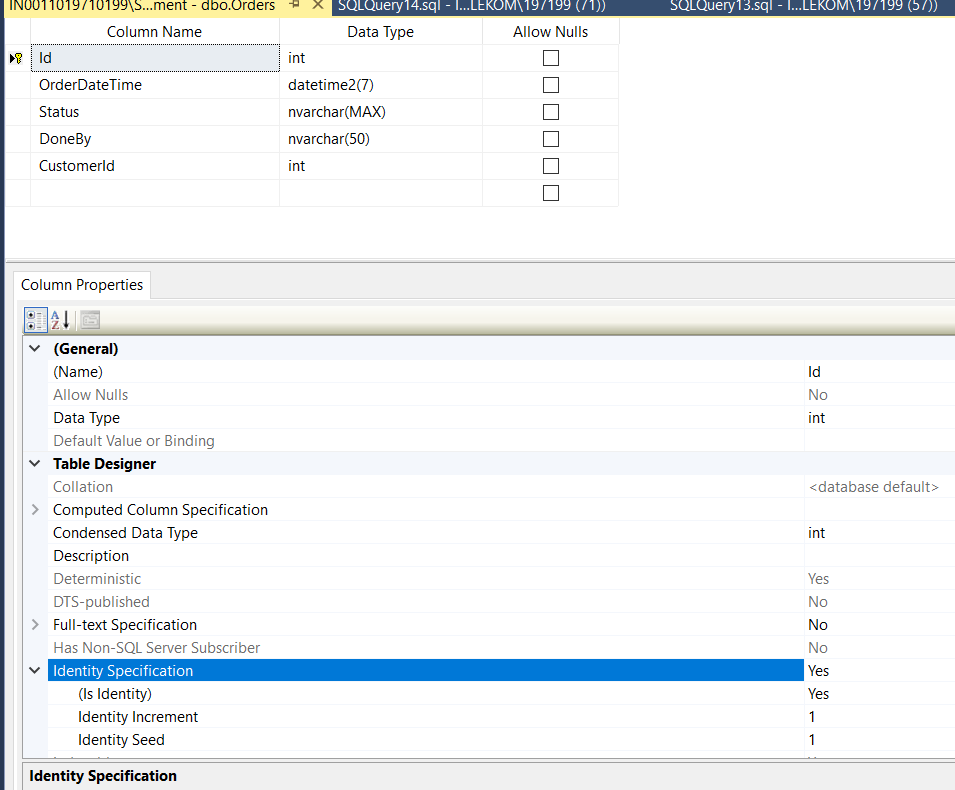most likely the jump is due to a transaction rollback (probably a bulk insert).
the identity value is not guaranteed to not have gaps. a transaction can update the identity value, but if it rollsback, then the identity value is not restored.
This browser is no longer supported.
Upgrade to Microsoft Edge to take advantage of the latest features, security updates, and technical support.

Hi,
I have had a Blazor Server application running on production for a while. There is an Orders table, user can insert records.
USE [InventoryManagement]
GO
/****** Object: Table [dbo].[Orders] Script Date: 9.01.2023 14:37:29 ******/
SET ANSI_NULLS ON
GO
SET QUOTED_IDENTIFIER ON
GO
CREATE TABLE [dbo].[Orders](
[Id] [int] IDENTITY(1,1) NOT NULL,
[OrderDateTime] [datetime2](7) NOT NULL,
[Status] [nvarchar](max) NOT NULL,
[DoneBy] [nvarchar](50) NOT NULL,
[CustomerId] [int] NOT NULL,
CONSTRAINT [PK_Orders] PRIMARY KEY CLUSTERED
(
[Id] ASC
)WITH (PAD_INDEX = OFF, STATISTICS_NORECOMPUTE = OFF, IGNORE_DUP_KEY = OFF, ALLOW_ROW_LOCKS = ON, ALLOW_PAGE_LOCKS = ON, OPTIMIZE_FOR_SEQUENTIAL_KEY = OFF) ON [PRIMARY]
) ON [PRIMARY] TEXTIMAGE_ON [PRIMARY]
GO
ALTER TABLE [dbo].[Orders] ADD DEFAULT ((0)) FOR [CustomerId]
GO
ALTER TABLE [dbo].[Orders] WITH CHECK ADD CONSTRAINT [FK_Orders_Customers_CustomerId] FOREIGN KEY([CustomerId])
REFERENCES [dbo].[Customers] ([Id])
ON DELETE CASCADE
GO
ALTER TABLE [dbo].[Orders] CHECK CONSTRAINT [FK_Orders_Customers_CustomerId]
GO
The Id column is the primary key and auto-increment by 1.

The problem is, this Id column increased one by one for a while, then suddenly became 1100. I checked the logs, and here is the insert statement.
2022-12-21 11:06:16.9792|0|DEBUG|Microsoft.EntityFrameworkCore.ChangeTracking|DetectChanges starting for 'IMSContext'.
2022-12-21 11:06:16.9792|0|DEBUG|Microsoft.EntityFrameworkCore.ChangeTracking|DetectChanges completed for 'IMSContext'.
2022-12-21 11:06:17.0001|0|DEBUG|Microsoft.EntityFrameworkCore.Database.Connection|Opening connection to database 'InventoryManagement' on server '.\SQLEXPRESS'.
2022-12-21 11:06:17.0001|0|DEBUG|Microsoft.EntityFrameworkCore.Database.Connection|Opened connection to database 'InventoryManagement' on server '.\SQLEXPRESS'.
2022-12-21 11:06:17.0001|0|DEBUG|Microsoft.EntityFrameworkCore.Database.Transaction|Beginning transaction with isolation level 'Unspecified'.
2022-12-21 11:06:17.0001|0|DEBUG|Microsoft.EntityFrameworkCore.Database.Transaction|Began transaction with isolation level 'ReadCommitted'.
2022-12-21 11:06:17.0305|0|DEBUG|Microsoft.EntityFrameworkCore.Database.Command|Creating DbCommand for 'ExecuteReader'.
2022-12-21 11:06:17.0305|0|DEBUG|Microsoft.EntityFrameworkCore.Database.Command|Created DbCommand for 'ExecuteReader' (0ms).
2022-12-21 11:06:17.0305|0|DEBUG|Microsoft.EntityFrameworkCore.Database.Command|Executing DbCommand [Parameters=[@p0='?' (DbType = Int32), @p1='?' (Size = 50), @p2='?' (DbType = DateTime2), @p3='?' (Size = 4000)], CommandType='Text', CommandTimeout='30']
SET NOCOUNT ON;
INSERT INTO [Orders] ([CustomerId], [DoneBy], [OrderDateTime], [Status])
VALUES (@p0, @p1, @p2, @p3);
SELECT [Id]
FROM [Orders]
WHERE @@ROWCOUNT = 1 AND [Id] = scope_identity();
2022-12-21 11:06:17.0305|0|INFO|Microsoft.EntityFrameworkCore.Database.Command|Executed DbCommand (2ms) [Parameters=[@p0='?' (DbType = Int32), @p1='?' (Size = 50), @p2='?' (DbType = DateTime2), @p3='?' (Size = 4000)], CommandType='Text', CommandTimeout='30']
SET NOCOUNT ON;
INSERT INTO [Orders] ([CustomerId], [DoneBy], [OrderDateTime], [Status])
VALUES (@p0, @p1, @p2, @p3);
SELECT [Id]
FROM [Orders]
WHERE @@ROWCOUNT = 1 AND [Id] = scope_identity();
2022-12-21 16:06:46.6661|0|INFO|Microsoft.EntityFrameworkCore.Database.Command|Executed DbCommand (1ms) [Parameters=[@p0='?' (DbType = Int32), @p1='?' (Size = 50), @p2='?' (DbType = DateTime2), @p3='?' (Size = 4000)], CommandType='Text', CommandTimeout='30']
SET NOCOUNT ON;
INSERT INTO [Orders] ([CustomerId], [DoneBy], [OrderDateTime], [Status])
VALUES (@p0, @p1, @p2, @p3);
SELECT [Id]
FROM [Orders]
WHERE @@ROWCOUNT = 1 AND [Id] = scope_identity();
2022-12-21 16:06:46.6661|0|DEBUG|Microsoft.EntityFrameworkCore.ChangeTracking|The foreign key property 'Order.Id' was detected as changed. Consider using 'DbContextOptionsBuilder.EnableSensitiveDataLogging' to see property values.
Here is the Order entitiy:
public class Order
{
public int Id { get; set; }
[Required]
public DateTime OrderDateTime { get; set; }
[Required]
[MaxLength(250)]
public int CustomerId { get; set; }
public string Status { get; set; }
[MaxLength(50)]
public string DoneBy { get; set; }
public List<OrderDetail> OrderDetails { get; set; }
public Customer Customer { get; set; }
}
Is this a bug? What is the reason that Id did not increment 1 by 1?
Thank you.
most likely the jump is due to a transaction rollback (probably a bulk insert).
the identity value is not guaranteed to not have gaps. a transaction can update the identity value, but if it rollsback, then the identity value is not restored.